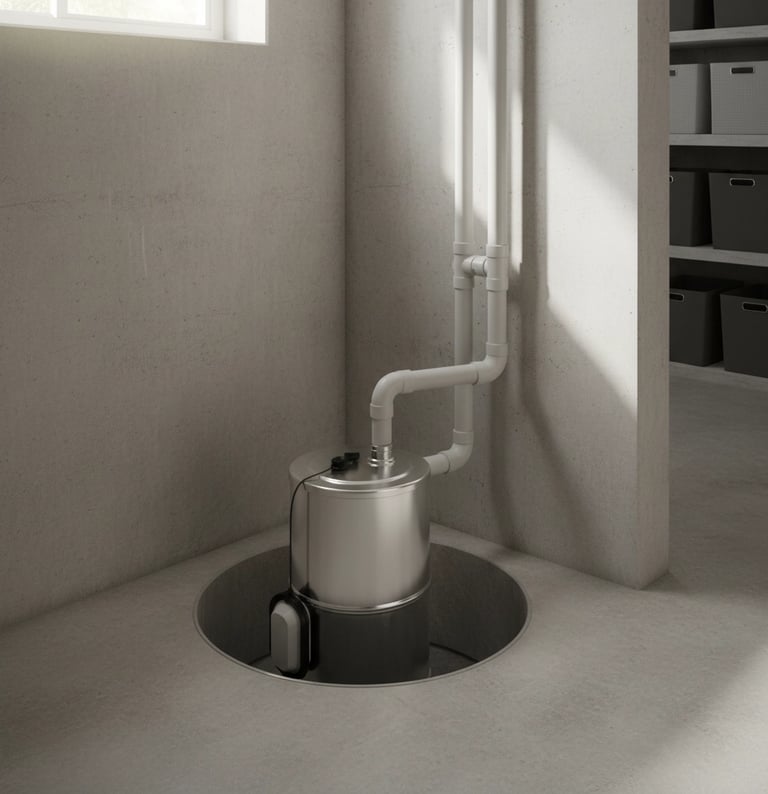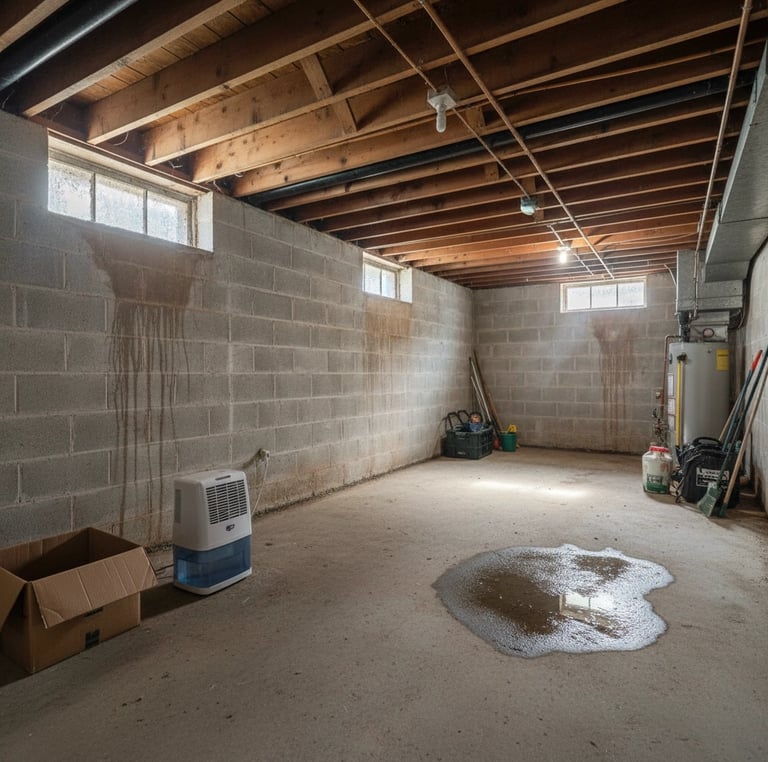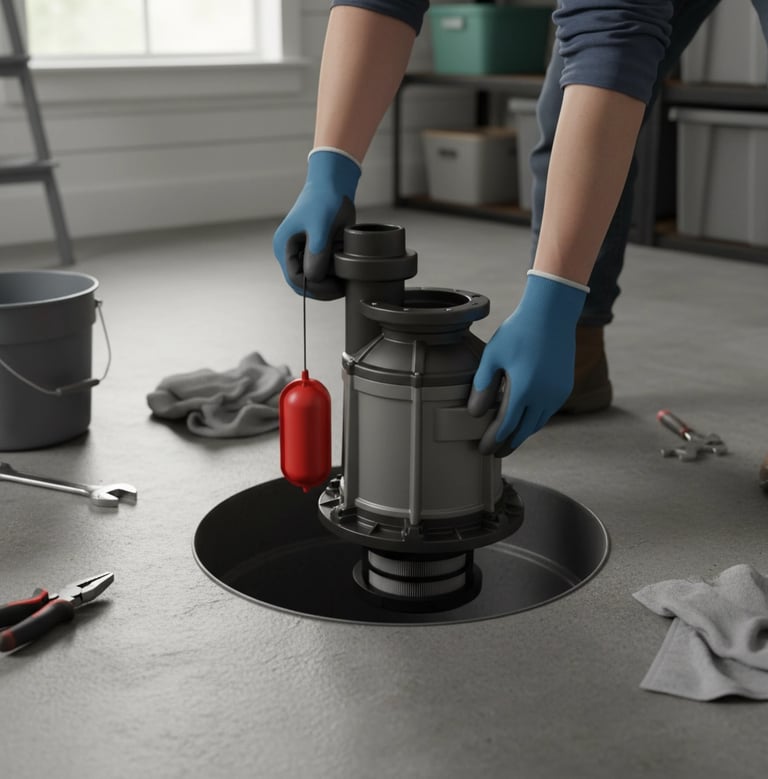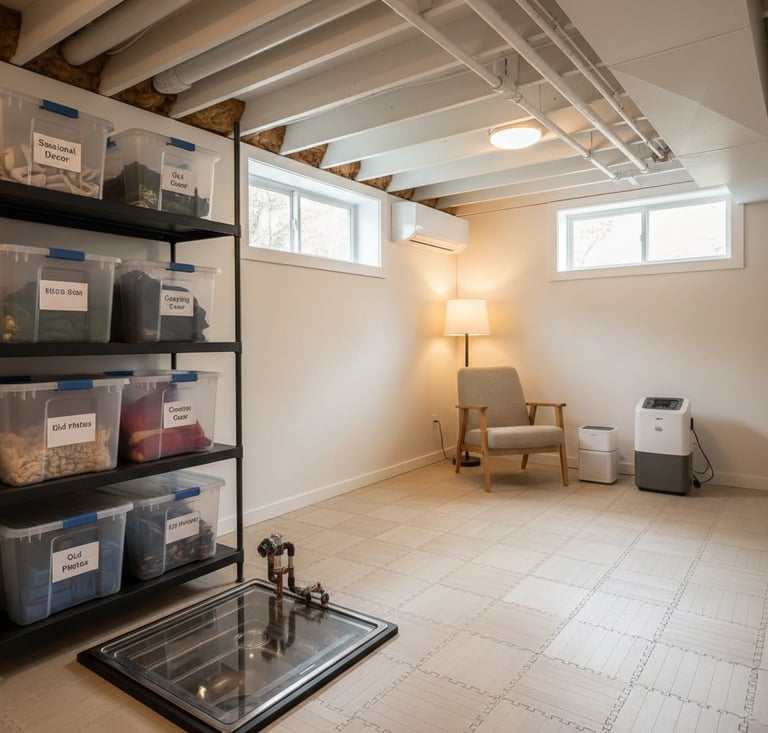Facing Your Basement Fears: What Homeowners Should Know About Sump Pumps, Floods, and Smells
Let's be honest: most of us avoid going downstairs until we absolutely have to. Maybe it's the mysterious humming sounds, that vague musty smell, or just the general "dungeon-like" vibe that makes you want to grab what you need and get back upstairs as quickly as possible. But here's the thing: your basement doesn't have to be the scary part of your house. Once you understand what's actually happening down there: especially with equipment like sump pumps: you'll feel a lot more confident about maintaining your home's foundation and keeping everything dry and fresh.
10/17/20255 min read


What's That Thing in the Corner? Understanding Your Sump Pump
If you've ever spotted a mysterious cylindrical device sitting in a small pit in your basement floor, you've found your sump pump. This unassuming piece of equipment is actually your home's unsung hero, working around the clock to keep water away from your foundation.
Think of your sump pump as a tiny bouncer for your basement. When water tries to crash the party (usually from heavy rain or melting snow), the pump kicks it out through a discharge pipe that leads away from your house. The system is surprisingly simple: water collects in a small basin called a sump pit, and when it reaches a certain level, a float or pressure sensor tells the pump to start working.
The pump then moves that water through pipes and away from your foundation, with check valves making sure it can't sneak back in. It's like having a 24/7 security system, but for water instead of burglars.
The Most Common Basement Nightmares (And Why They Happen)
Standing Water After Storms
You walk downstairs after a heavy rain and find puddles on your basement floor. Your first thought might be "Is my house falling apart?" The good news: probably not. The less good news: water is definitely finding its way in, and it won't stop on its own.
Standing water usually means one of two things: either you don't have a sump pump when you need one, or your existing pump isn't keeping up with the water volume. Even if the water eventually dries up, its presence is a red flag that shouldn't be ignored.
That Musty, "Basement-y" Smell
We've all smelled it: that distinctive basement odor that somehow manages to be both musty and damp at the same time. This smell isn't just unpleasant; it's often your nose's way of detecting mold or mildew growth that thrives in damp conditions.
The tricky part about basement odors is that they can come from several sources. Sometimes it's stagnant water sitting in your sump pit, bacterial growth from debris accumulation, or problems with ventilation. The key is figuring out whether it's a simple cleaning issue or something that needs professional attention.
Mysterious Noises and Equipment Fears
Basements are naturally echo-y, which makes every sound seem more dramatic than it actually is. That humming from your sump pump? Totally normal when it's running properly. Strange grinding or rattling sounds? Those are worth investigating.
Warning Signs That Need Your Attention
Your basement equipment will usually give you plenty of warning before major problems occur. Here's what to watch (and listen) for:
Sump Pump Red Flags
Strange grinding or rattling noises often mean the impeller (the part that moves water) is jammed or damaged
Excessive vibration could indicate bent or deformed internal parts
The pump cycling on and off rapidly might signal wiring problems
Visible oil leaks are a sign your pump may fail soon
General Basement Concerns
White, chalky residue on walls (called efflorescence) indicates water is moving through your foundation
Discolored walls or warped floors suggest ongoing moisture problems
Persistent dampness even during dry weather points to ventilation or drainage issues
What You Can Handle Yourself
Good news: there's quite a bit you can do to keep your basement in good shape without calling in the professionals.
Monthly Sump Pump Testing
Once a month, pour a bucket of water into your sump pit and watch what happens. Your pump should kick on, move the water out efficiently, and then shut off. Listen for any unusual noises and make sure the discharge pipe is flowing freely.
Basic Cleaning and Maintenance
Spring is the perfect time for a deeper clean. After disconnecting your pump from power (safety first!), you can remove it from the pit, rinse off dirt and debris with a garden hose, and clean out the pit itself with a shop vacuum.
Wipe down the inside of the pit and remove any large debris that might cause future odors or efficiency problems. Once everything is thoroughly dry, reassemble and test the system.
Simple Odor Solutions
If you're dealing with mild basement odors, start with improving air circulation. A dehumidifier can work wonders for reducing moisture levels, and ensuring your sump pit has proper ventilation can prevent stagnant water smells.
When to Call The Heartfelt Handyman
Some basement issues are definitely best left to the professionals, especially when they involve electrical components, major water damage, or structural concerns.
Definitely Call for Help When:
Your sump pump is making alarming noises or leaking oil
You're finding water in areas far from your sump pit
The smell persists even after cleaning and improving ventilation
You notice cracks in your foundation walls or floors
Your pump cycles constantly but never seem to clear the water
You're dealing with sewage backup or contaminated water
Gray Area Situations
Sometimes it's not immediately clear whether you need professional help. If you're unsure, it's always better to get a quick assessment rather than risk major damage. Issues like intermittent flooding, unusual pump behavior, or persistent moisture problems often have underlying causes that aren't obvious to untrained eyes.
Your Stress-Free Action Plan
Taking care of your basement doesn't have to be overwhelming. Here's a simple approach that will keep you ahead of problems:
Create a Simple Routine
Monthly: Test your sump pump and do a quick visual check of your basement
Seasonally: Clean your sump pit and check for any new cracks or moisture issues
Annually: Have a professional inspection if you've noticed any concerning changes
Know Your Limits
You don't need to become a basement expert overnight. Focus on recognizing changes and unusual signs rather than trying to diagnose every issue yourself. When in doubt, a quick phone call to a trusted handyman can save you from much bigger headaches down the road.
Build Relationships Before You Need Them
The best time to find a reliable handyman is before you have an emergency. Getting to know local professionals like The Heartfelt Handyman means you'll have someone to call when problems arise and someone who can offer preventative maintenance to help you avoid problems in the first place.
Take the Fear Out of Basement Ownership
Your basement doesn't have to be a source of anxiety. With basic understanding of how systems like sump pumps work, regular simple maintenance, and knowing when to call for backup, you can transform your basement from "scary unknown territory" to "well-maintained part of my home."
Remember, most basement problems start small and give you plenty of warning. By staying aware of changes and addressing issues promptly, you're protecting not just your basement but your entire home's foundation and value.
If you're in the Trenton area and want peace of mind about your basement systems, don't hesitate to reach out for a consultation. Sometimes just having a professional take a look and explain what's normal versus what needs attention can make all the difference in how you feel about that space downstairs.
After all, your home should be a place of comfort and security: from the top floor all the way down to the basement.












